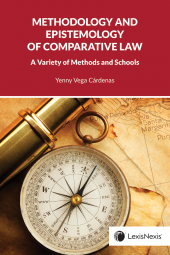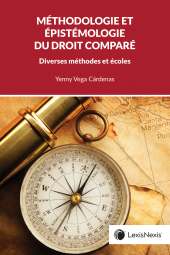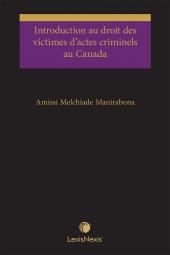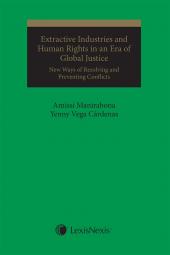Extractive Industries and Human Rights in an Era of Global Justice: New Ways of Resolving and Preventing Conflicts
One Year Subscription Only Terms
Subscribers receive the product(s) listed on the Order Form and any Updates made available during the annual subscription period. Shipping and handling fees are not included in the annual price.
Subscribers are advised of the number of Updates that were made to the particular publication the prior year. The number of Updates may vary due to developments in the law and other publishing issues, but subscribers may use this as a rough estimate of future shipments. Subscribers may call Customer Support at 800-833-9844 for additional information.
Subscribers may cancel this subscription by: calling Customer Support at 800-833-9844; emailing customer.support@lexisnexis.com; or returning the invoice marked 'CANCEL'.
If subscribers cancel within 30 days after the product is ordered or received and return the product at their expense, then they will receive a full credit of the price for the annual subscription.
If subscribers cancel between 31 and 60 days after the invoice date and return the product at their expense, then they will receive a 5/6th credit of the price for the annual subscription. No credit will be given for cancellations more than 60 days after the invoice date. To receive any credit, subscriber must return all product(s) shipped during the year at their expense within the applicable cancellation period listed above.
Product description
This collection of expert academic articles aims to investigate how conflict prevention and resolution methods should more effectively support the global justice movement not only at an international level, but also at extractive industry sites in the four corners of the world. By understanding how many areas respond to concerns of social, cultural and environmental justice, the authors of several chapters of this collaborative book intend to pinpoint questions of fairness and redress in relation to “glocal” (i.e. global and local) governance.
A focus will be on cases involving Canadian extractive companies, as the country is home to more than 70% of the world’s largest mining corporations, with operations in Africa, Asia, South and Central America.
Features
- Academic specialists and leaders - written by contributors from around the globe offering a diverse and well-rounded perspective of extractive industry practices and its global ramifications
- Peer-reviewed - all work has been internally peer-reviewed ensuring the quality and merit of the research
- International application - explores case studies from around the world where the largest mining corporations have set up operations including Africa, Canada, and South and Central America
The Collection of Articles
PART 1: MANAGING AND RESOLVING NATURAL RESOURCE-INDUCED CONFLICTS IN THE ERA OF GLOBAL AND ENVIRONMENTAL JUSTICE
- Chapter 1. The Concept of Global Justice and Its Contribution towards Better Understanding and Resolving Natural Resource Conflicts -- Yenny Vega Cárdenas & Patricia Urteaga-Crovetto
- Chapter 2: Toward Barrier Removal for Transnational Human Rights Litigation in Canadian Courts --Amissi M. Manirabona
- Chapter 3: Effectiveness Framework For Home-State Non-Judicial Grievance Mechanisms -- Charis Kamphuis & Leah Gardner
PART 2: NATIONAL AND REGIONAL JUDICIARY SYSTEMS ROLE IN RESOLVING NATURAL RESOURCES-INDUCED DISPUTES
- Chapter 4 : The Attitude of the Kenyan Judiciary on Standards of Public Participation, and Environmental Assessments in Mohamed Ali Baadi v Attorney General and other cases -- Robert Kibugi
- Chapter 5: Nature as a Subject of Rights: a Mechanism to Achieve Environmental Justice: The Atrato River Case in Colombia -- Yenny Vega-Cárdenas & Nathalia Parra
- Chapter 6: The African Court of Human and Peoples’ Rights Decision in the Ogiek Case: An Appraisal -- Adebayo Majekolagbe & Olabisi D. Akinkugbe
PART 3: STATE POLICIES OVER NATURAL RESOURCES AND THE PREVENTION OF CONFLICTS
- Chapter 7: The Doctrine Of Permanent Sovereignty Over Natural Resources In Tanzania: A Panacea For Natural Wealth Plundering By Mining Companies? -- Baraka Kanyabuhinya
- Chapter 8 : Towards Responsible, Conflict-Free Mining Operations in the Lao PDR – Phu Bia Mining as a Case Study -- Éric Mottet & Frédéric Lasserre
- Chapter 9: Iron Ore Company (IOC) of Canada versus the Innu’s: Perspective of a Dispute from a Local Lens -- Pierre-Louis Têtu & Frédéric Lasserre
PART 4: FREE AND PRIOR CONSULTATION AS STRONG MECHANISM TO MANAGING AND PREVENTING MINERAL RESOURCES-INDUCED HUMAN RIGHTS VIOLATIONS
- Chapter 10: Rituals for Dispossession. Indigenous Peoples, Oil and Negotiations in the Peruvian Northern Amazon Basin -- Patricia Urteaga Crovetto
- Chapter 11: Social and Scientific Fight Against Mining Project In The Arid Region of Baja California Sur, Mexico -- J. Antonio Martinez de la Torre
- Chapter 12: Can Free, Prior, And Informed Consent Help Combat Mining Land Use Conflicts In Zambia? -- Sara Ghebremusse
- Chapter 13: Prior Consultation For The Use Of Land Destined To Extractive Activities -- Luis José Béjar Rivera, Juan Manuel Otero Varela & Carlos Alberto Villanueva Martínez
PART 5: PREVENTING MINERAL RESOURCES-INDUCED HUMAN RIGHTS VIOLATIONS THROUGH INNOVATIVE STATE AND CORPORATE INITIATIVES
- Chapter 14: The European Union’s 2014 Non-Financial Reporting Directive: Mandatory Ex Post Disclosure – But Does It Need Improvement? -- W. Gregory Voss
- Chapter 15: Corporate Social Responsibility : Opportunity and Challenges in Tunisia’s Oil Sector -- Khadija Ben Matoug
- Chapter 16: International CSR Policies in the Mining Sector and Their Implementation in Colombia -- Gustavo Adolfo Yepes, Luis Bustos, Ana María Devia Arias & Julián Mauricio Cruz Pulido
A Timely Read
- Professors & Students - to teach and to learn about the effect that mining and other extractive companies have on indigenous communities as well as examine dispute prevention and resolution mechanisms for overcoming these complexities
- Legal Practitioners - who work for extractive industry companies, or, alternatively, who represent indigenous and local communities to help them better understand human rights and socio-environmental conflicts arising from mining activities
- NGO’s - to advocate for human rights, environmental rights and global justice by understanding the global paradigm of extractive industry standards and policies
- Government - to develop policy to address concerns related to human rights and the environment in areas with extractive industries actively present or where they are contemplating allowing an extractive company access to local resources
Contributing Authors
| Olabisi D. Akinkugbe
| Carlos Alberto Villanueva Martínez
|
| Ana María Devia Arias
| Khadija Ben Matoug
|
| Luis José Bejar
| Nathalia Parra Meza
|
| Luis Bustos
| Éric Mottet
|
| Leah Gadner
| Juan Manuel Otero
|
| Sara Ghebremusse
| Julián Mauricio Cruz Pulido
|
| Charis Kamphuis | Pierre-Louis Têtu
|
| Baraka F. Kanyabuhinya
| Jose Antonio Martinez de la Torre
|
| Robert Kibugi
| Patricia Urteaga-Crovetto
|
| Frédéric Lasserre
| W. Gregory Voss
|
| Adebayo Majekolagbe
| Gustavo Adolfo Yepes
|
Table of contents
PART 1: MANAGING AND RESOLVING NATURAL RESOURCE-INDUCED CONFLICTS IN THE ERA OF GLOBAL AND ENVIRONMENTAL JUSTICE
PART 2: NATIONAL AND REGIONAL JUDICIARY SYSTEMS ROLE IN RESOLVING NATURAL RESOURCES-INDUCED DISPUTES
PART 3: STATE POLICIES OVER NATURAL RESOURCES AND THE PREVENTION OF CONFLICTS
PART 4: FREE AND PRIOR CONSULTATION AS STRONG MECHANISM TO MANAGING AND PREVENTING MINERAL RESOURCES-INDUCED HUMAN RIGHTS VIOLATIONS
PART 5: PREVENTING MINERAL RESOURCES-INDUCED HUMAN RIGHTS VIOLATIONS THROUGH INNOVATIVE STATE AND CORPORATE INITIATIVES
Related products
-
New!Preorder
 Methodology and Epistemology of Comparative Law: A Variety of Methods and SchoolsNew!Release date: November 29, 2024$125.00
Methodology and Epistemology of Comparative Law: A Variety of Methods and SchoolsNew!Release date: November 29, 2024$125.00 -
 Méthodologie et épistémologie du droit comparé : Diverses méthodes et écolesRelease date: July 10, 2024$100.00
Méthodologie et épistémologie du droit comparé : Diverses méthodes et écolesRelease date: July 10, 2024$100.00 -
 Introduction au droit des victimes d’actes criminels au CanadaRelease date: August 27, 2020$140.00
Introduction au droit des victimes d’actes criminels au CanadaRelease date: August 27, 2020$140.00
 Lexis Nexis
Lexis Nexis 